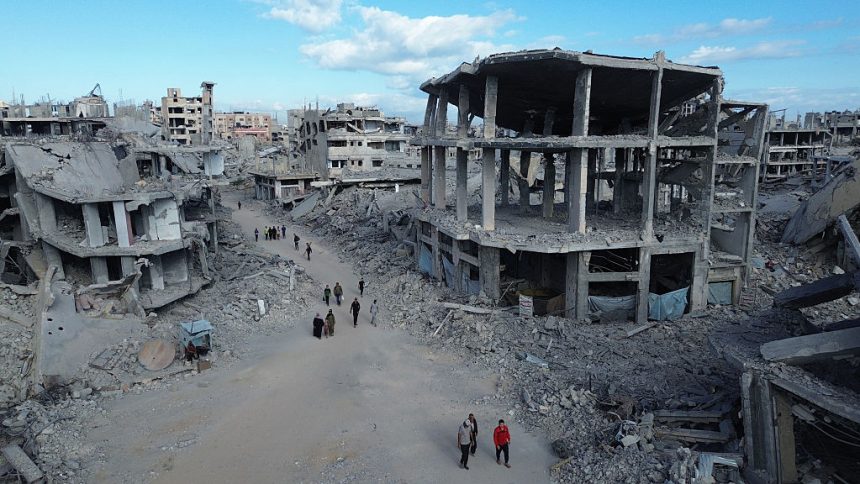An aerial view shows the extensive destruction in southern Gaza’s Khan Yunis following the implementation of a ceasefire and the withdrawal of Israeli forces on Oct. 15, 2025. Credit – Muhammed Eslayeh—Getty Images
A fragile ceasefire has taken hold in Gaza, just over two years after war broke out. But the conflict has devastated Gaza—the United Nations has estimated that rebuilding will cost an estimated $70 billion, and the region faces a long road to recovery.
The fighting has also contributed to environmental devastation. A new report from the Arava Institute, an academic and research center looking to advance environmental peace-building in the Middle East, has found that the war has left approximately 69% of Gaza’s infrastructure damaged, and destroyed the region’s water and energy systems.
Even before the outbreak of war, Gazans faced a number of environmental concerns. “The situation in Gaza on the ground prior to October 7, 2023 was, from an environmental and humanitarian point of view, not good,” says David Lehrer, Arava Institute’s director of applied environmental diplomacy.
Gaza faced an energy supply deficiency, receiving only 50% of the energy it needed, and 95% of water was polluted, according to Lehrer, who added that the region faced additional environmental hazards such as disease and air and soil pollution from poor waste disposal.
The war only compounded these problems. Gaza’s fuel shortage, caused by Israel’s blockade of the territory, led to the shutdown of essential infrastructure such as water and wastewater treatment necessary for environmental and public health. (Despite the ceasefire, Israel is still not allowing fuel or gas to enter Gaza as of Oct. 14, according to Reuters.) Water availability plummeted to as little as 8.4 liters (2.2 gallons) per person per day—far below the World Health Organization’s emergency minimum of 15 liters (3.9 gallons). Raw sewage, which has gone untreated and continued to build up during the war, is contaminating the aquifer Gaza shares with Israel and Egypt—creating ideal conditions for waterborne disease outbreaks.
More than 80% of croplands have been damaged or destroyed, the report continues, further impacting food security and the region’s ability to feed itself.
“The war has done a massive hit on the productivity of land,” says Lehrer. “Fields that produced vegetables that supply the local market have been decimated. Large areas have been hit by munitions which spread all kinds of noxious gasses that seep into the soil.”
The report, which serves as an update to a 2024 analysis of the war’s environmental and humanitarian impacts, relies on research from international organizations like the United Nations and World Health Organization, along with eyewitness accounts from aid workers.
The researchers identified a three-phase framework for recovery: the absorptive phase, in which immediate humanitarian aid, emergency shelter, and water, sanitation, and hygiene services are provided; the adaptive phase, which would include off-grid renewable energy and localized water treatment; and the transformative phase, which would restore ecosystems and embed climate resilience into planning.
During the transitional period of recovery, it will be essential to create systems that don’t cause further environmental damage, notes Lehrer. “The international community needs to think about how to build a model of living in temporary systems where you know you’re not making matters worse,” says Lehrer. “[We need] systems in place that, for example, treat wastewater and recycle it for reuse and agriculture, desalination of water that can be then used for drinking, or solar power to provide electricity, rather than diesel generators that are continuing to pollute.”
A number of technologies are already being piloted in Gaza, the report says—including modular solar microgrids, atmospheric water generators, biofiltration wastewater systems, urban agriculture initiatives, and recycled-rubble construction materials.
With a fragile ceasefire in place, Lehrer says that it’s essential that the recovery process prioritizes sustainability and autonomy.
“It will be many, many years before Palestinians in Gaza are able to return to a permanent housing situation,” he says. “They need to have sustainable living conditions that provide them with all their needs—including energy, water, and food security.”
Write to Simmone Shah at simmone.shah@time.com.









